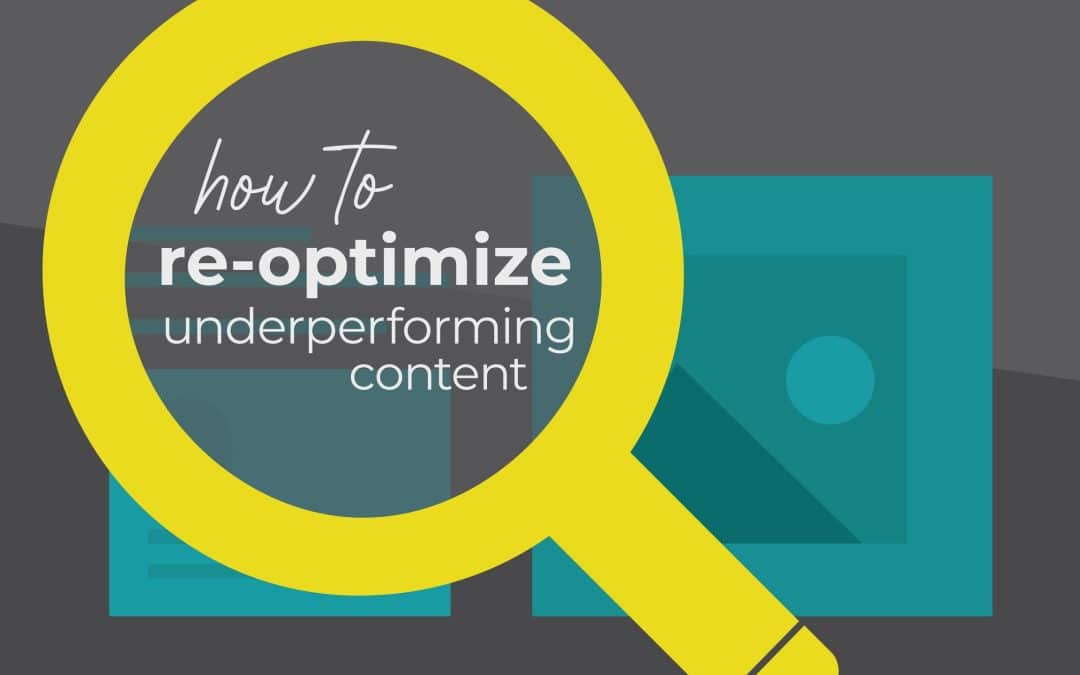If you’ve noticed that your content isn’t doing the way you expected, it may be time to re-optimize it. There are many ways to optimize your content to get it to rank better in google. We go over a few tips in this blog.
Look at the page metrics
Finding the root of the problem is the first step to optimizing your content. Start with using tools like Semrush, Google Analytics, or Ahrefts to look at the average position of your content and which keywords you are ranking for. Pay attention to which pages get the least engagement. If individuals don’t spend enough time on the page to read your content, it’s time to optimize it.
Look at metrics like page views, sessions, bounce rate, and time on page. This will give you a good understanding of what pages are doing well and which ones need a little tweaking.
Keyword tips
Choosing the optimal keywords for your company includes doing some research. If your content is underperforming, focus on your target keyword for each page. If you try to rank for a competitive keyword against well-known companies such as HubSpot, it will be impossible to get to the top of page one.
Long-tail keywords
Utilizing long-tail keywords is a great way to rank higher. These are especially helpful for newer and smaller brands. Long-tail keywords are more specific and reach a target audience. They also account for 70% of all traffic.
For example, instead of “digital marketing,” you could try “digital marketing services in Minnesota.” Individuals using long-tail keywords in their searches are more likely to convert because they are looking for solutions and not just browsing.
Keyword placement
Where you place your keywords makes a huge difference in Google’s eyes. The way you word things matters and has an impact on your rankings. You have to spell it out to Google and make your page focus obvious. Placing your keywords in specific places is the key to getting the most out of your content.
Some tips for keyword placement:
- H1 heading
- At the beginning of the meta title and meta description
- In one or more of the H2 and H3 headings
- In the first paragraph
- Naturally added throughout the text
Also, keep in mind that keyword stuffing is something that google will penalize your site for. It can be easy to overdo it when you are just starting your SEO journey, but it is important to write for your audience rather than the rankings.
The importance of the meta title
While they may seem insignificant, these four things can be the driving factor of whether readers click on your page and keep reading. The meta title is what gets readers hooked and to click on your website. The more descriptive and precise it is, the more likely they will click on your page over competitors.
For example, if I search “how to make puppy chow,” the results in Google look similar, but only one has the word “easy” in the meta title. That one added word entices more people to click on the link pushing it to the top of the rankings.
While the meta title is what gets people to click on your page, the meta description, heading, and subheadings are also essential. Headings should be thought of like hooks for your readers. They keep people reading and get them to stay on the page longer. If someone goes onto a website and isn’t interested after scanning the page and reading the headings, they will leave and find another page.
Are you writing quality content?
Google is starting to prioritize the quality of content you are writing and whether it is helpful. They are cracking down on websites that are just writing for rankings and views and are pushing the articles that are most helpful to readers to the top of the rankings.
When looking at your content, ask yourself if it is helpful to your readers. Add in sections of information where applicable and remove parts that are not needed. Write about things that are relevant to your brand and audience.
Optimizing underperforming content can take some research and strategy, but it is something that everyone should do every once in a while. Hard work pays off, and after utilizing the tips in this article, your content and rankings will benefit. If your company needs help with content management, give us a call, and we will get you back on track!


